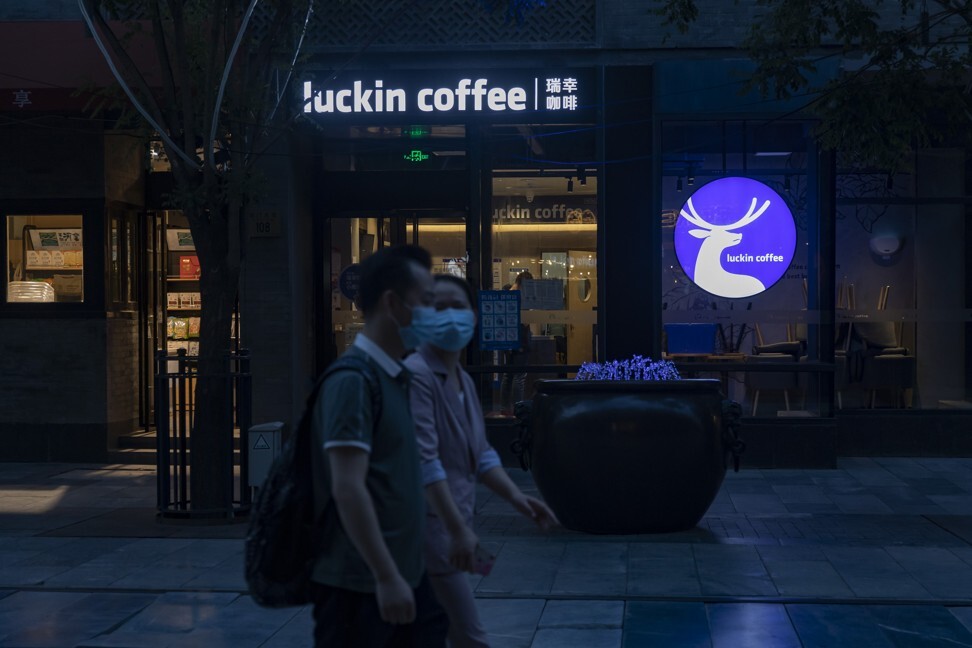
Credit Suisse targets Luckin Coffee ex-billionaire’s family assets to recoup losses after stock toast
- Swiss bank seeks court order to appoint liquidators to chairman Lu Zhengyao’s offshore family trust
- Credit Suisse is facility agent for a US$500 million-odd loan to the ex-billionaire, backed by Luckin Coffee shares
The Swiss bank is seeking a court order to appoint liquidators for Haode Investment Inc., according to a notice posted in the BVI Gazette on Thursday. Haode, controlled by Lu’s family trust, defaulted on a loan facility backed by Luckin shares, according to a statement from lenders in early April.
Lu’s investment vehicle has disputed that it is in default and has requested an injunction against Credit Suisse in Hong Kong to prevent the bank from commencing liquidation proceedings.
Spokespeople for Credit Suisse and Luckin declined to comment.

The liquidation attempt adds to a long list of challenges facing Lu, who became a billionaire after his fast-growing Xiamen, Fujian-based coffee chain, touted as China’s answer to Starbucks, went public in the US with help from some of the biggest names on Wall Street.
Much of Lu’s wealth has been wiped out by a 92 per cent plunge in Luckin’s stock since April, when the company disclosed that some of its employees may have fabricated billions of yuan in sales.
Luckin Coffee’s fall from grace has made it a poster child for concerns about Chinese corporate governance, fuelling a debate in Washington over the extent to which US money and capital markets should be accessible by firms from a growing geopolitical rival.
Since the accounting scandal broke out, Nasdaq Inc has pushed for a delisting of Luckin from its exchange, while the Senate approved legislation Wednesday that could lead to some Chinese companies being barred from US bourses.
Lu said in a statement on Wednesday that he is “deeply disappointed” Nasdaq is moving to delist the shares before Luckin releases final results of an internal probe into its accounting.
China’s regulator’s investigation of Luckin scandal underscores importance of US$7.2 trillion stock market
Banks that participated in the loan facility to Lu’s investment vehicle signalled in April that they plan to sell Luckin shares that were pledged as collateral. It is unclear whether the lenders have started offloading them, or how much money they will be able to recoup.
Credit Suisse and Morgan Stanley each put up about US$100 million as part of the loan facility, while China’s Haitong International Securities lent about US$140 million, a person familiar with the matter said last month. Other banks involved include Barclays, Goldman Sachs and China International Capital Corp.
Credit Suisse out of Tencent-backed WeDoctor’s Hong Kong IPO after Luckin Coffee’s accounting scandal
Few banks have seen a bigger fallout from the Luckin saga than Credit Suisse, which was the lead underwriter for its initial public offering in May last year and the secondary sale in January.
The lender lost a high-profile Hong Kong IPO in the wake of the scandal and reported a five-fold increase in loan-loss provisions at its Asia-Pacific unit, primarily due to the Luckin margin debt.
The bank is conducting an internal review of the case, and scrutiny on loans to Chinese companies has increased, according to people familiar with the matter who declined to be named discussing private matters. China is core to Credit Suisse’s strategy to win business from rich entrepreneurs across Asia.
With additional reporting by SCMP reporter Yujing Liu

